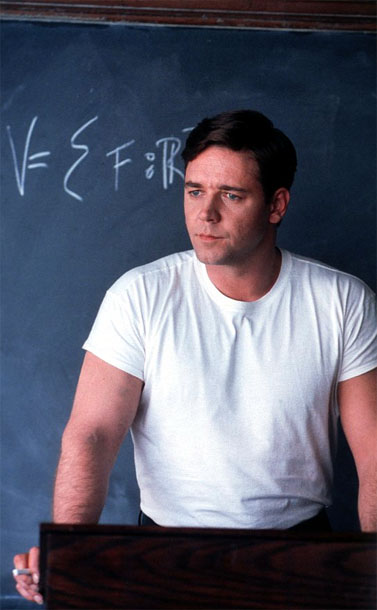Everybody was kung fu fighting (1/29/02)
____________
A Beautiful Mind. [Ron Howard, 2001.]
Another fucking triumph of the human spirit: curiously obnoxious mathematical wizard Russell Crowe/John Nash rockets through Princeton on the fast track to immortality, but is shunted off to neverneverland by schizophrenic delusions which begin with the idea that he is cracking secret codes for the spooks [represented by Ed Harris] and escalate to an allconsuming obsessive belief that every scrap of text that crosses his path [newspapers, magazines, advertising jingles, street signs, the fine print at the bottom of the label, any label] contains some kind of secret message from the Russians, or the pod-people, or somebody, necessitating the construction of gigantic [and visually very striking] collages meant to represent the progress of a hidden conspiracy whose machinations only he is capable of perceiving. After repeated cycles of institutionalization and release and a few decades hanging around Princeton acting gonzo, he finally recovers after a fashion, and, his contributions to game theory having been recognized in the interim, wins the Nobel Prize in economics — leading to the grand dramatic finale in which, having gone fifteen rounds with the Apollo Creed of mental illness, he stumbles blindly with his medal from the podium crying “Adrian! Adrian!” in an Italian-Stallion accent and embraces his longsuffering wife Jennifer Connelly, who depicts faithfully a woman who should be nominated for sainthood.
This is based, as they say, on a true story, though the true story in question [cf. Sylvia Nasar’s book of the same title] differs in several critical respects from this one. More obvious and purely cinematic debts include the character of the deranged detective in
Dark City [a film in which, perhaps not coincidentally, Ms. Connelly played essentially the same role that she does here], Darren Aronovsky’s [much more interesting and explicitly cabalistic]
Pi [1998],
Shine [the Riemann hypothesis equals the Rachmaninoff concerto], and, thanks to my own ongoing delusional expectation that Ed Harris was about to morph into Tommy Lee Jones,
Men In Black, though I never quite received that final reassurance I was seeking that the headlines in the tabloids really are [Secrets Entrusted Only To A Few] coded messages from the alien masters of the cosmos.
Nor while they are engaged in embroidery can the authors resist exploiting the usual jokes about the pathetic attempts of geeks to pick up girls: Nash is represented as one of those legendary pioneers of the direct “Want to fuck?” approach whose exploits we used to hear in tales whispered around the bunsen burner, and his analysis of the strategic options of the pickup artist is supposed to be the origin of his interest in game theory. [Actually Nash took the much more pedestrian approach of attending a seminar on international trade, but this version is admittedly funnier, and for all I know about either hustling in bars or international trade they follow the same rules.]
Crowe, however, is remarkable, approaching the standard of the great cinematic loonies [one thinks of Robin Williams in
The Fisher King and Peter O’Toole in
The Ruling Class], and you have to wonder where he studied to perfect his mannerisms: a misfocused gaze, a curiously hunched posture and strangely constrained walk, an oddly unselfconscious manner of mumbling to himself.
But the real hero of the real story is Princeton University, which allowed the real Nash, a gaunt purple-sneakered specter with rotting teeth, to lurk in its shrubbery for a couple of decades until he returned from the Ozone; indeed, they gave him a computer account [a big deal in the old punched-card-and-mainframe days] and library privileges, and tolerated his habit of leaving lengthy messages on the campus blackboards which purported, e.g., to be letters from Nikita Khrushchev to Moses about the factorization of large numbers. There is a hidden message here, sure enough, though it has nothing to do with Commie plots to smuggle nuclear weapons; rather with patience, magnanimity, a tolerance for eccentricity, and the occasionally justified human faith that the degenerate panhandler bumming cigarettes in the park with a plastic pint of Kamchatka vodka in the pocket of his Army jacket is, as you would yourself to be, a creature with an immortal soul with a capacity for surprise who may yet redeem himself.
____________‘I’ is someone else (1/7/02)

